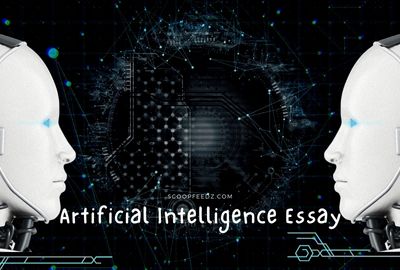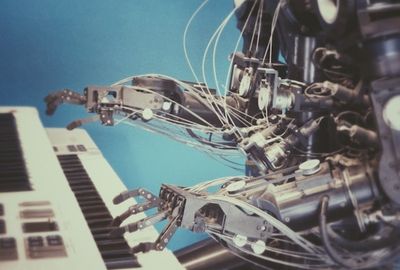The detailed Artificial Intelligence Essay will help students better understand this rapidly evolving technology. It will help students in many ways.

How AI will improve research skills?: AI will assist students in their research skills and definitely save them time & money.
Understand the basics of AI: An AI essay can provide a foundation of knowledge about the field, helping students understand the basics of Artificial Intelligence and its usage.
Learn about the potential impacts of AI: Students will be able to comprehend the potential impacts of AI on our society and the economy and how it will change our lives.
Different perspectives on AI: This detailed article can also help students explore different perspectives on the field, such as AI’s potential benefits and risks.
Introduction to Artificial Intelligence
AI is the field associated with computer science and engineering primarily focusing on making intelligent machines that act & behave like humans. The main goal of AI research is to develop computers that can think and learn like humans. That includes creating systems that can easily understand, communicate, and interact with humans in a natural tone.
READ | SPECIAL 3+ My School Essay for classes 1, 2, 3, 4, 6 – 12th!
In the past, many intelligent systems and applications were built using AI methodology some of them are machine learning, deep learning, natural language processing, and robotics.
The crux of AI systems is to enable algorithms that perform tasks that may require human intelligence, such as learning, decision-making, problem-solving skills, and pattern recognition.
How these systems are working effectively? The systems are trained on huge amounts of data, make precise decisions, and give us the output we want without explicit programming.
Many industries, including healthcare, finance, education, and transportation, could benefit from AI. It is already implemented in various applications, such as speech recognition, image classification, and language translation. I believe that the evolution of artificial intelligence is likely to have a significant impact on society and our day-to-day lives.
The evolution of AI
A long history of Artificial intelligence dates back to the 1950s. Here we provide you with a brief introduction to AI’s evolution which includes the following points:
- The 1950s: The term artificial intelligence was first introduced by John McCarthy at a conference at Dartmouth College.
- 1955: Logic Theorist, the first AI program, was developed by Herbert Simon and Allen Newell.
- 1956: The first AI conference was held at MIT.
- 1969: The first successful self-sufficient and autonomous cars appeared in the 1980s, with Carnegie Mellon University’s Navlab and ALV projects.
- Expert systems became popular in the 1980s and are computer programs that are designed to mimic the decision-making abilities of experts.
- The field of machine learning, which involves teaching computers how to learn without explicit programming, rose to prominence in the 1990s.
- In the Late 1990s: Deep learning methodology, a type of machine learning started that involves training artificial neural engines on vast amounts of data.
- In the 2010s: AI became more extensively used in various applications, including image and speech recognition, language translation, self-driving autonomous vehicles, and many more.
- In the year 2020s: With the continuous advancement in the field of Artificial Intelligence, it is increasingly used in diverse sectors including healthcare, finance, and education.
It is more likely that AI will impact a wide range of industries over the coming years.
How is Artificial Intelligence transforming the world?
Artificial intelligence is already used in many industries. Some of the sectors where AI is transforming the world:

Healthcare Sector:
AI is being used in healthcare, a great help in analyzing medical images, providing diagnosis assistance, also providing personalized treatment based on recommendations.
Finance Sector:
It will help detect fraud, analyze extensive financial data, and provide personalized investment suggestions.
Education Sector:
Schools and colleges use AI to personalize learning, grade assignments, and provide feedback.
Transport Sector:
AI is used to develop autonomous vehicles, optimize routes, and improve the traffic system.
Customer service:
AI answers questions, resolves customers’ queries, and provides personalized recommendations based on their interests.
Manufacturing:
Artificial intelligence (AI) helps improve efficiency, reduce waste, and optimize production.
By combining artificial intelligence with modern technology, we can improve our lives in countless ways. As technology advances, it will likely have a broader impact on the world.
What are the qualities of artificial intelligence?
There are several qualities of AI, and here we have listed some key qualities.
Intelligence: AI systems are smart enough, which means they can learn, apply logical reasoning, and solve users’ problems in a split second.
Creativity: These systems help you come up with relevant ideas or suggestions and their solutions, resulting in creativity.
Decision-making: AI systems can analyze and make decisions based on input data.
Self-awareness: Few AI-based systems are efficient enough to be self-aware, meaning they can recognize and understand themselves.
Adaptability: They can adapt and learn from new things and based on input data, which helps them understand things & improve over time.
Natural language processing: These systems can understand and communicate in natural language, so they can interact with humans that sounds natural.
Perception: AI systems can process and analyze sensory data that allows them to see, hear, and sense their environment.
Overall, systems developed on AI technology are intelligent, adaptable, and able to interact with the world just like humans.
Use of AI Applications in diverse sectors
Artificial intelligence has the potential to revolutionize many industries. Some sectors have already realized significant improvements by using AI such as Healthcare, Finance, Education, Transportation, Customer service, Manufacturing, Retail, and agricultural sectors.
How will AI change work?
Artificial intelligence (AI) is expected to have a significant impact on the way we work, as it has the potential to automate many tasks that humans can perform which ultimately leads to high efficiency and productivity, and open up new opportunities.
This technology may, however, also have negative consequences, such as the displacement of some jobs to machines since algorithms are capable of performing tasks previously done by humans. \\done
Some of how AI is expected to change work include:
Automation of tasks: AI has the potential to automate many tasks, like data entry, processing, and analysis, which could lead to greater efficiency and productivity.
Creating new job opportunities: AI is also expected to open up new job opportunities since building, maintaining, and improving AI systems will require skilled workers.
Displacement of some jobs: But AI could also make some jobs obsolete because machines and algorithms can do things that humans used to do.
Changes in the skills and knowledge needed for certain jobs: As AI takes over some tasks, the skills and knowledge needed for only certain jobs may start changing. For example, workers may need to learn how to work with AI systems or get new skills in data analysis and machine learning.
AI will have a big impact on everyday life, and some tasks will likely be done by machines and new opportunities will open up. Employees must know about the latest changes in AI and to be able to adapt to a changing job market.
Future of AI in Coming Years
AI will likely play a significant role in transforming many industries, and the future of artificial intelligence (AI) is unpredictable because technology is always changing and getting better. AI will probably have a big impact on a lot of industries and aspects of our lives.
Some of the ways AI is expected to evolve in the coming years include the following:
Increased automation:
AI is likely to automate more tasks, which could make many industries more efficient and productive.
Improved natural language processing:
AI will continue to get better at understanding and making up human-like language, which could make it easier for humans and machines to talk to each other naturally.
Development of autonomous systems:
AI is expected to be a key part of making autonomous systems, like cars that drive themselves and drones that can fly.
Personalization:
AI is expected to be used to make experiences and recommendations more personalised, such as in healthcare, finance, and retail.
Increased use in healthcare:
AI is likely to be used more than ever before to help with diagnosis, treatments, and finding new drugs.
Overall, AI is likely to keep getting better in a lot of different areas, and the technology will be used in diverse ways. As AI advances, it will likely have a significant impact on society and how we live and work.
10 Lines on Artificial Intelligence Essay
- Artificial intelligence (AI) is a computer science and engineering field focused on creating intelligent machines.
- AI systems are made to be smart, flexible, and able to interact with the world in ways that are similar to how humans do.
- AI can be done in many ways, such as through machine learning, deep learning, natural language processing, and robotics.
- AI has the potential to transform many fields, such as medicine, finance, education, and transportation.
- AI is already being used in many diverse ways, such as recognizing speech, sorting images, and translating languages.
- AI is a field that is changing quickly and is likely to become more important in many aspects of our daily lives.
- AI has the potential to automate several tasks and make them more efficient and productive. However, it could also make some jobs obsolete.
- AI is likely to keep getting better in a variety of fields, and the technology will be used in more and more different ways.
- AI is likely to have a huge impact on the economy as well as society, and it will likely change how we live and work.
- As AI keeps getting better, people and society need to think about the increasingly significant ethical implications of this technology.
|| READ NEXT ||
- 10 Lines on New Year Essay 2024
- 2000 Words Artificial Intelligence Essay (2024)
- Essay on Punctuality for Students 10 Lines, & 500 Words
What are the Pros and Cons of artificial intelligence (AI)?
AI has the potential to change many industries and make our lives better in a variety of ways. AI has its pros and cons, just like any other technology.
Pros of AI:
Increased efficiency and productivity: AI has the potential to automate a lot of tasks, which could make a lot of industries more efficient and productive.
New job opportunities: AI system development, maintenance, and improvement will create new jobs.
Personalization: AI can be used in areas like healthcare, finance, and retail to give more personalised experiences and suggestions.
Improved decision-making: AI systems can analyze information and decide what to do based on that data, which makes decisions better.
Cons of AI:
Some jobs could be lost: As machines and algorithms get better at doing tasks that humans used to do, AI could make some jobs obsolete.
Ethical concerns: AI raises many ethical concerns, such as privacy issues, bias, and the possibility that it could be used in harmful ways.
Dependence on technology: Increasing the use of AI could lead to a dependence on technology that could have negative consequences if the systems fail or are hacked.
Loss of human skills: Humans may lose some job-related skills as AI takes over some tasks.
AI has both pros and cons, so it’s important to think about how it might affect the economy and society.
Conclusion Artificial Intelligence Essay
AI systems are made to be smart, flexible, and able to interact with the world in ways that are similar to how people do. AI can be done in many ways, such as machine learning, deep learning, processing natural language, and robotics. With these methods, you can create a wide range of smart systems and programs.
AI could transform many industries and improve our lives in countless ways. Students learn from writing AI essays. It will help them learn about AI, research it, and consider its social impacts.
TABLE OF CONTENTS